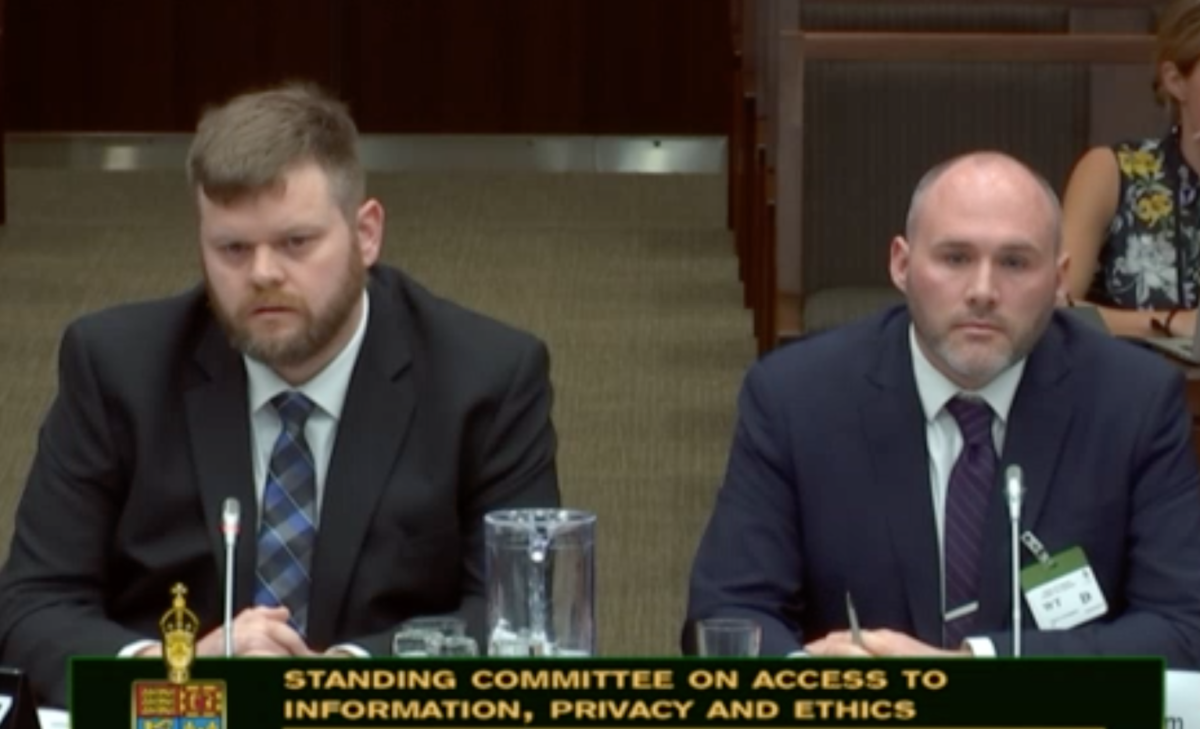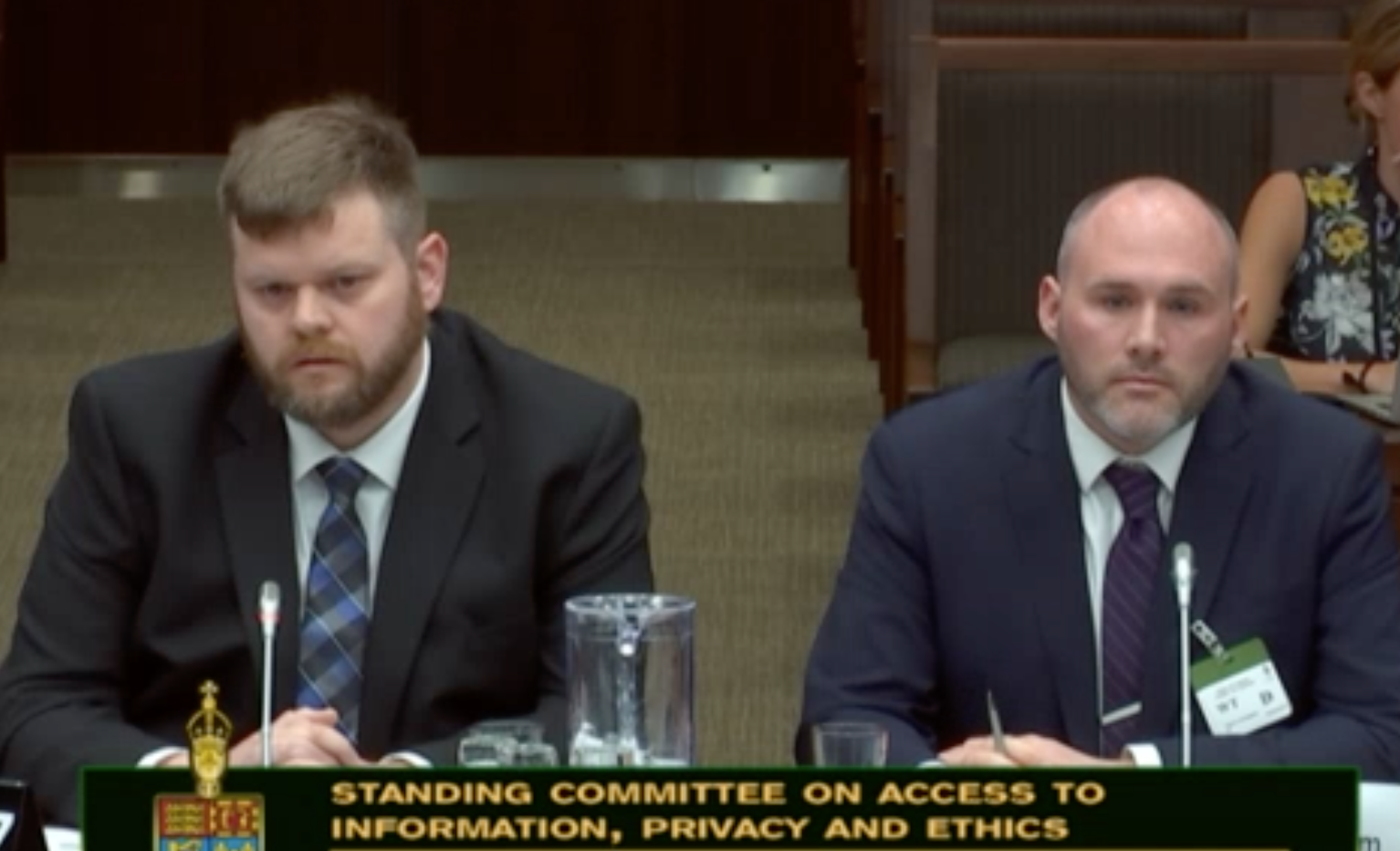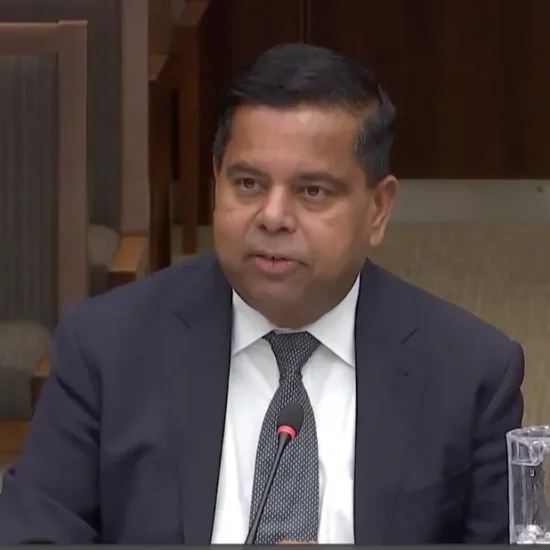
Bob Mackin
A report by a House of Commons committee contains harsh words for the principals of a Victoria company implicated in the Facebook and Cambridge Analytica political datamining scandal.
The Access to Information, Privacy and Ethics Committee’s June 19 report, called Addressing Digital Privacy Vulnerabilities and Potential Threats to Canada’s Democratic Electoral Process, summarized the April 24 testimony of AggregateIQ co-founders Zack Massingham and Jeff Silvester.
They denied AIQ had been a department or subsidiary of SCL or Cambridge Analytica and denied using Facebook data improperly obtained by anyone. Silvester said the company merely conducts online advertising, makes websites and software for clients, which included the pro-Brexit campaign in the United Kingdom and the Republican Party in the United States.

Silvester (left) and Massingham of AggregateIQ (ParlVu)
Whistleblower Christopher Wylie, who hails from Victoria, had called AIQ a franchise of SCL and that Silvester had boasted to him that what the company was breaking laws, a claim that Silvester denied. AIQ has also worked for BC Liberals, including Mike de Jong and Todd Stone, and the B.C. Greens. AIQ is under investigation by the official information and privacy watchdogs in British Columbia and the United Kingdom.
“The committee does not concur with AIQ’s version of the facts, as the witnesses’ testimony is inconsistent, full of contradictions, and conflicts with the testimony of several other reliable witnesses,” said the report. “For example, Mr. Massingham stated that AIQ has no connection with SCL, yet he is listed on certain documents as the head of SCL Canada, and SCL listed his direct telephone line as the number for SCL Canada. Mr. Massingham said he was unaware of the reference to his direct line on SCL’s website until it was reported in the media. Both Mr. Massingham and Mr. Silvester deny that AIQ ever presented itself as SCL Canada, or that SCL Canada – as an entity – has ever existed.”
AIQ had been paid $5.4 million, 40% of the budget for the Vote Leave campaign that successfully pushed in 2015 for United Kingdom voters to choose separation from the European Union in a referendum.
Silvester stated AIQ had been working with the United Kingdom Information Commissioner, responding to letters in May 2017 and January 2018. The report said that AIQ provided the committee with its two responses to the ICO. The March 5, 2018 letter stated “We are not subject to the jurisdiction of your office… We consider our involvement in your office’s investigation to be closed.”
“Although, technically, AIQ did respond to the Information Commissioner in the form of two letters, it appears that the Commissioner considered that its replies constituted a refusal to cooperate with her.”
U.K. Commissioner Elizabeth Denham testified to the committee about AIQ’s lack of cooperation, noting that there had been new communications between the parties that could lead to “better collaboration in the future.”
“The committee wishes to emphasize that it has complete confidence in Ms. Denham and trusts her judgement. The Committee also notes that Mr. Silvester appeared before the Committee a second time on June 12 to answer further questions. In general, he made the same statements he had made during his first appearance.”
The report included a dissenting opinion by NDP and Conservative members on the committee, who reiterated the unanimous view that Silvester and Massingham’s evidence was contradicted by other witnesses.
“Mr. Massingham appeared to be reticent to answer in a fulsome manner during his initial appearance before the Committee, which prompted the Committee to issue a summons to appear again,” said the statement by the NDP and Conservative members. “Mr. Massingham failed to appear again when summoned, which has raised serious questions about the ability of parliamentary committees to conduct their work unobstructed on behalf of Parliament and the people of Canada.”
“In the opinion of the New Democratic and Conservative members of the Committee, allowing Mr. Massingham’s actions to stand unchallenged would set a lasting precedent that could undermine the ability of other Members of Parliament and Committees to gather witness testimony from witnesses on issues of national importance,” it said.
They recommended the committee chair, Bob Zimmer, be directed to raise Massingham’s no-show with the Speaker of the House of Commons.
The committee recommended the Government of Canada “must urgently act” to protect Canadians’ privacy, by strengthening the powers of the Privacy Commissioner, including significant fines against those that breach the Personal Information Protection and Electronic Documents Act. The report recommended subjecting political activities to privacy laws, and to regulate organizations and political actors to make their collection, use and disclosure of personal information more transparent. In British Columbia, provincial parties are subjec to privacy laws. The Office of the Information and Privacy Commissioner began an investigation last September, after complaints arising from the 2017 provincial election.
Requirements for transparency, according to the report, could include identification of who paid for a political ad, the target audience and mandatory registration of political advertising outside of Canada.
“The scandal has brought to light issues relating to mass data harvesting, the use of data for nefarious purposes, and the threats and challenges these questionable methods can create for democracies around the world,” the report said. “The evidence that the committee has heard so far gives rise to grave concerns that the Canadian democratic and electoral process is similarly vulnerable to improper acquisition and manipulation of personal data.”
Listen to theBreaker.news Podcast for highlights of AIQ testimony at the House of Commons committee on April 24 and June 12, and a similar committee in the U.K. on May 16.
Click here for all of theBreaker’s coverage of the ongoing scandal.
Support theBreaker.news for as low as $2 a month on Patreon. Find out how. Click here.











